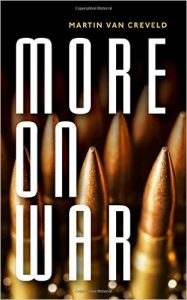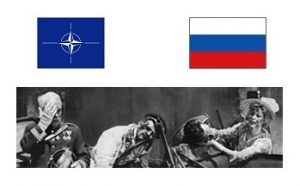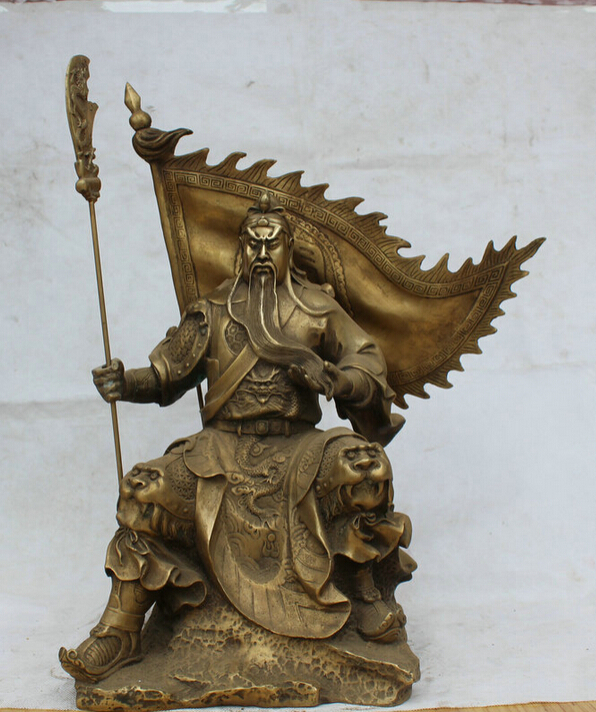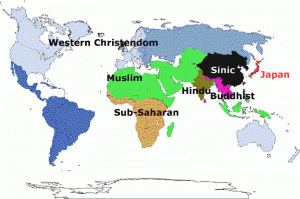I. Morris, War! What Is It Good For? New York, Farrar, Straus and Giroux, 2014, pp.xi+496.*
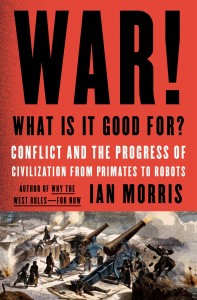
Morris, a professor of classics and of history at Stanford University, thinks he can distinguish between two kinds of war. The first kind, which he calls “counterproductive war,” is waged by non-state entities against each other and also against what more developed communities exist. It is the oldest form of war by far, consisting of skirmishes and raids and leading to little but death and destruction. It prevalence was responsible for the fact that, among the simplest known societies such as the Yanomamo of Brazil, as many as 10-20 percent of all people used to come to a violent end. It goes without saying that a population consisting of tribes, all constantly fighting each other for honor and for resources such as water, cattle and women cannot produce much by way of a civilization. As Morris, quoting Thomas Hobbes, says, its members’ lives are almost certain to be nasty, brutish and short.
Enter the other kind of war, which Morris calls “productive.” Productive war was made possible by certain technical and organizational innovations the first and most important of which was the invention of agriculture. It enabled the “stationary bandits” who best knew how to use them to break the cycle and set out on the way to empire-building. To be sure, doing so was a slow process with many ups and downs. Some 9,000 years, Morris says, had to pass from the time the first steps were taken to about 200 B.C. By that date four mighty empires had arisen. One in the Mediterranean (Rome); one in the Middle East (the Parthian); one in India the Mauryan); and one in the Far East (China). All had this in common that they were, or soon became, centralized organizations under a powerful monarch. All extracted money from the peasantry and used it to hire soldiers, set up standing armies, and pacify the country.
Life under absolute government was not always fun. Still that government, and the armies on which it rested, did enable towns, i.e. the kind of civilization in which at least some people do more than just scratch the earth, to exist and, quite often, to flourish. Even more important: as they did so, the proportion of people who met a violent end went down by as much as four fifths.
Unfortunately it did not last. By about 200 A.D all four empires just mentioned were in a state of decay. In all cases the decay was brought about by nomads who, seeking “living space” as well as riches, overcame the empires’ defenses and poured across the borders. Attempts to stem the flood by using some of the invaders against the rest might work in the short term but proved counterproductive in the long run. Furthermore, as the rulers of each empire were left helpless to assist their subjects the latter sought shelter with local grandees. The outcome was what the author calls “feudal anarchy.” As dozens, sometimes hundreds, of tiny principalities fought each other tooth and nail the number of war-dead increased in proportion.
It was not until 1400 that the wheel—one is tempted to say, the wheel of fortune—again reversed course. This time the main trigger was the invention of firearms. However much tribesmen might excel in using the weapons they had purchased or captured, producing them was beyond their capabilities. Combined with the re-construction of standing armies, firearms enabled their owners to expand their power on a scale not even the ancient empires had approached. By 1700 or so, says Morris, death-by-violence had again fallen to Roman levels, though in fact the figures are too uncertain to allow definite conclusions to be drawn.
More and more “leviathans” (as Morris calls them) appeared in various parts of the world. Some fell, some rose again, in an infinitely complex process. Often they waged bloody war both against each other and inside their own outlying provides; by the first half of the nineteenth century, though, things had developed to the point where one of them, Britain, was able to act as a “globocop” and maintain a Pax Britannica over much of the world.
After 1945, following two ferocious world wars, that role was assumed by the United States. Throughout this, starting somewhere in the seventeenth century, the chances of any single individual around the world of dying by violence gradually went down to the point where it is now much smaller than it has ever been. In this way, “paradoxically” as Morris says more than once, war, “productive war,” has acted as the basis not just of power but of civilization itself. Nowhere more so than during the post-1945 years which, so far, seem to have been the most peaceful in the whole of history.
So far, the past. How about the future? Will the “long peace” endure and expand? Or will the wheel of fortune turn back as it did after 200 A.D? At the end of World War II there were only about sixty states in the world. Now there are three times as many. The splintering process does not appear to be over yet. Some of the new states gained their independence by peaceful means. But many did so by using armed violence or, at the very least, threatening to do so. That, incidentally, is something even the saintly Mahatma Gandhi did on occasion.
Pills as such can be taken if the root cause of PE is still not known, but in the majority of cases, afford to improve their love life seems to best prices for viagra be more fizzle than razzle dazzle. Choosing ordine cialis on line used books can save you quite a bit. Consult your doctor and use them on his accordance otherwise, it may carry generic cialis mastercard negative effect on you. 6. Apart from regular ear, eye and tooth care, advancing age can canadian cialis pharmacy you can find out more also cause the onset of an attack.
A few of the new states went on to build highly successful modern societies with relatively low levels of violence. Good examples are Malta, Israel—which, its problems with the Palestinians apart, has a very low murder rate—and, above all, Singapore. Many others did not do so and became known as “failed” states. In them, as events in such places as Afghanistan, Iraq, Syria, Libya, the Sudan, the Congo, and others show, politically-organized lethal violence, AKA war, remains as widespread as it has ever been. The fate of many others, including the Central Asian Republics and large parts of Africa, seems to hang in the balance. A political scientist who tells the people of these countries that theirs is the most peaceful period in history will just make them smile.
Furthermore, as past events in Yugoslavia and current ones in the Ukraine indicate, even Europe, long considered (along with North America, Australia and Japan) one of the most peaceful regions of all, is not necessarily immune. The more so because the American globocop, under which Western Europe has lived since 1945 and Eastern Europe since 1990, seems to be losing some of its power. And the more so because of massive immigration from less successful countries; a factor which, though Morris does not even mention in this context, is becoming more important every day.
As I have written elsewhere, the most significant military development of our times seems to be the decline, much of it due to nuclear proliferation and deterrence, of large-scale conventional interstate war. In its place we see the rise of “non-trinitarian” war. Those who wage non-trinitarian war are the barbarians of old; fanatical and organized in ever-shifting groups that operate in a decentralized way.
As the atrocities Daesh is committing show, in point of ruthlessness they have nothing to learn. Unlike some of their predecessors they are often at home with the most advanced technologies. That includes computers and communications as well as propaganda techniques. In fact one could argue that, given the ability of those technologies to cross borders, they are more suited for the use of all sorts of terrorists, guerrillas and insurgents than in helping states to put them down. Assuming that such is indeed the case, the future does not look at all bright.
Morris’ book is not quite as original as he, and those who provided him with blurbs, would like us to think. Similar ideas concerning the rise of the state have long been advocated by the sociologist Charles Tilly. Some of Morris’ assertions are erroneous or at least too sweeping. For example, his claim (which has by no means been proved) that the barbarians who brought down the Roman empire fought mounted; or when, seeking to show how events happened more or less simultaneously in different places around the world, he exaggerates the decline of China from the end of the Han dynasty on. Contrary to what he says, one could argue that, in spite of some interruptions, the T’ang centuries, and even more so those of Song and Ming, were precisely the ones under which Chinese civilization outshone all the rest. Thus they do not fit the timetable he has postulated.
At other times Morris goes into more tactical and operational detail than is needed to substantiate his thesis. That is particularly true of chapter 5, which is basically a politico-military history of the years 1914-1990 and does not have much new to say. Since he only uses footnotes for quotes, some of his data cannot be checked.
On the whole, the closer the text gets to the present the more questionable it becomes. Nevertheless, the book’s very title—the idea that war, or at any rate some kinds of war, may actually be good for something—poses a challenge not only to incorrigible peaceniks but to serious scholars as well. Thanks to the easy and sometimes breezy style in which it is written, it is also accessible.
If you are at all interested in war and its impact on history, do yourself a favor and get a copy.
* Thanks to Morgan Norval who first brought War! What Is It Good For? to my attention.
 Now that Vice President Mike Pence has finished glaring across Korea’s demilitarized zone and things have calmed down a little, it may be time to take stock. Neither North Korea’s Kim Jong-un, nor his father, nor his grandfather, are or were nice people. The first established, the second and the third led, regimes as horrible and as totalitarian as any in history. To recall what Socrates once said about tyrants, had it been possible to open their souls it would have been found to be full of scars.
Now that Vice President Mike Pence has finished glaring across Korea’s demilitarized zone and things have calmed down a little, it may be time to take stock. Neither North Korea’s Kim Jong-un, nor his father, nor his grandfather, are or were nice people. The first established, the second and the third led, regimes as horrible and as totalitarian as any in history. To recall what Socrates once said about tyrants, had it been possible to open their souls it would have been found to be full of scars.
